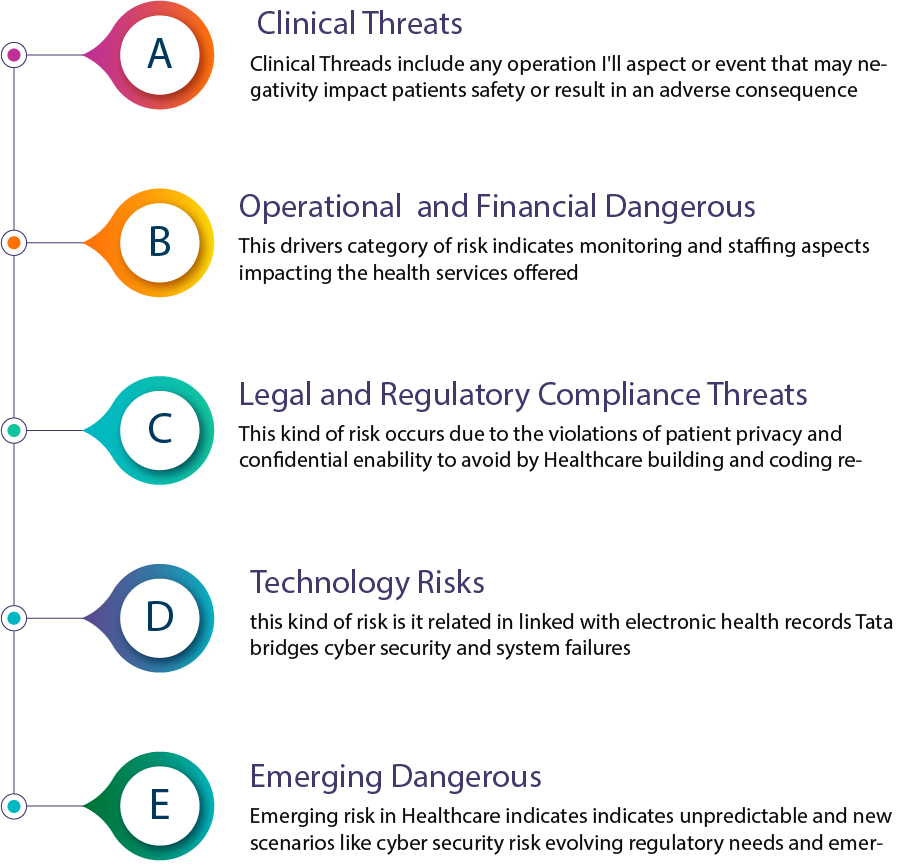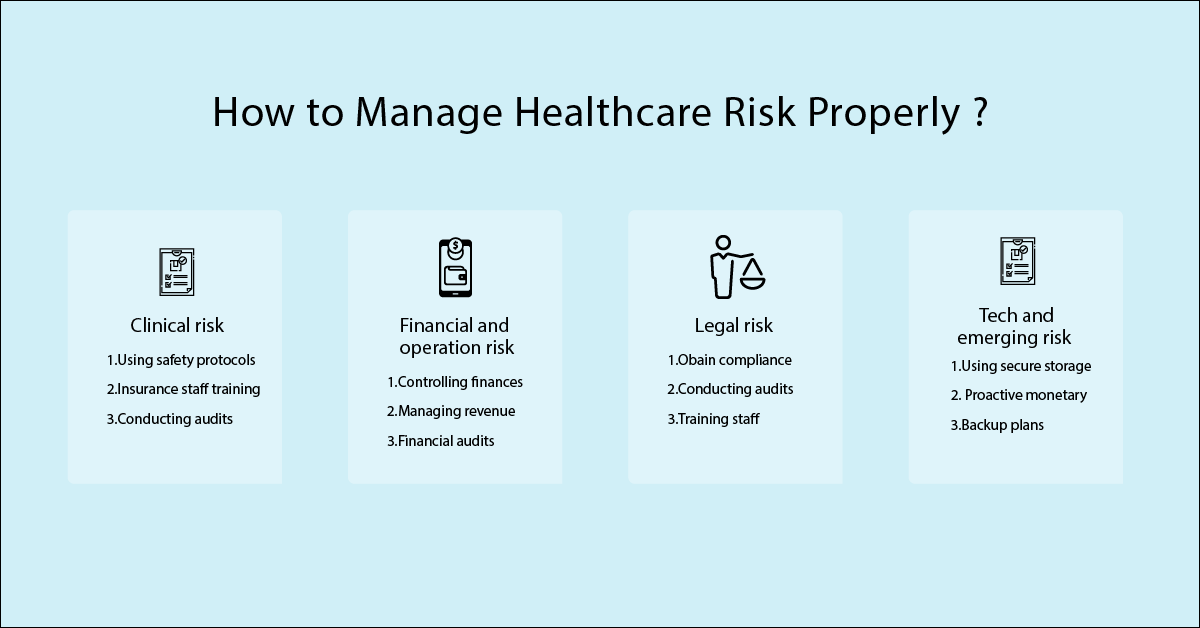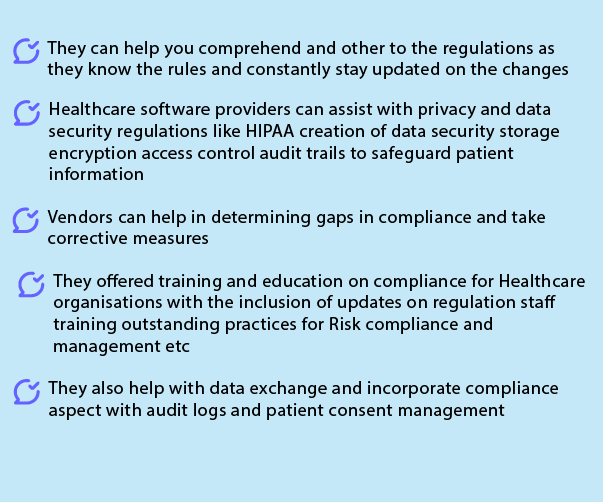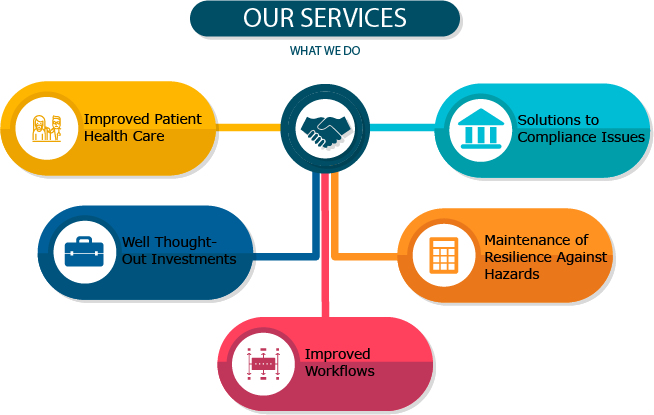All to Know About Enterprise Risk Management in Healthcare in 2023: 101 Guide
-

Ashok Kumar Singh CEO
- HealthcareIndustries
Table of Contents
- ERM in Healthcare: A Quick Overview of the Essential Concepts
- An Effective Healthcare ERM Program: What are the Core Aspects?
- The Presence of Risk Ranking and Their Management in Healthcare
- ERM in Healthcare: Strategies to Get the Most Out of It
- First Rite – Your One-Stop Solution in Healthcare Software Development
ERM in Healthcare: A Quick Overview of the Essential Concepts
Medical Enterprise Risk Management (ERM) is a remarkable strategy that aims to maximise value preservation and production. It successfully achieves this by managing the hazards, challenges, and uncertainties and how they relate to the total value.
In the words of the reputed teams of healthcare software development vendors, the aim of Enterprise Risk Management in healthcare is –
- To locate and analyse a diverse range of risks impacting the accomplishment of health institution objectives
- To make sure that all risks are properly accountable
- To create and implement appropriate and remarkable risk mitigation monitoring programs and the likes.
An Effective Healthcare ERM Program: What are the Core Aspects?

This remarkable process brings countless benefits that help solve the complicated functioning of healthcare establishments, organisational, and other issues.
The Presence of Risk Ranking and Their Management in Healthcare
Healthcare organisations encounter various dangers when providing patients with safe and hassle-free medical services. Let’s look at the categorisation of hazards as per the Crowe report that will help you comprehend how to struggle against these threats by offering proper healthcare ERM strategy-

A remarkably planned ERM for healthcare companies can resolve all these risks. A well-experienced healthcare software development provider can enable you to execute the ERM approach by delivering strong and secure software remarkably.

ERM in Healthcare: Strategies to Get the Most Out of It
Have a look at a step-by-step guide to implement ERM in healthcare and get the most out of it –
Define the Business Objectives
Try to first consider why you need healthcare ERM and the risks it can tackle. Create an ERM execution plan that clearly defines the purpose and the advantages the company will achieve from successfully implementing them. This plan should also highlight all steps essential to minimise or diminish the determined dangers.
Evaluate Your Current Risks and Emphasise Them
Then, categorise the determined threats as per their nature and influence on your healthcare organisation. Then, it is essential to analyse the determined threats according to their occurrence probability and influence. Establish a risk assessment matrix including these crucial factors and visually represent risk levels.
Develop a Risk Management Team
Developing a risk management team to execute the ERM strategy in your healthcare institutions is crucial. This will allow you to supervise and maintain the ERM process through regular meetings and information sharing to comprehend risk management principles, tools, methods to solve the increasing issues, etc.
Look for a Skilled IT Tech Partner
All the assimilated information can be utilised for establishing an RMIS or Risk Management Information System for your hospital or clinic. You can team up with an IT vendor to create a risk management solution, outsource the entire project, or use software development out staffing. These below-enlisted choices depend on your specific needs and resources –

When selecting between the above two options, consider your specific project requirements, constraints in budget, timeline and flexibility demands, in-house resources, and control level you wish to have.
RMIS Development and Integration
If you aim to outsource the RMIS project to be created by a vendor, the company will handle the whole software creation process for you. This will begin with offering extensive consultations. Then, the specialists will create a UI/UX design for your upcoming RMIS system and establish its functionality.
The QA engineers will test all the developed parts to ensure RMI software's accuracy and security. The development team will also enable you to launch the system on the day of its release.
Maintenance and Constant Improvement
The responsibility of the IT vendor doesn't stop when the RMIS becomes ready. The vendor specialists will continuously assimilate the early user's feedback and make system upgrades. In this way, you can stay assured that the technical aspect of your healthcare ERM will be in safe hands.
Possible Difficulties in Healthcare Risk Management to Stay Prepared For
According to the best minds associated with healthcare learning management system development, healthcare organisations should stay prepared to avoid risks for the health of their patients. To do this successfully, it is essential to determine the major challenges in risk management. This will help you keep your staff and patients secure.
Overcome Compliance and Regulatory Challenges
Healthcare institutions encounter complicated compliance and regulatory difficulties that cover clinical care, patient rights, and data privacy. This is why it is essential for organisations to invest in the realisation and execution of regulations. Failure to meet such regulatory requirements can jeopardise patient safety, privacy, and the quality of care offered.
Vendors of healthcare software development can enable you to prevent such troubles in the below-enlisted ways –

Management of Data
Managing humongous piles of data in healthcare is a challenging feat as it needs to be assimilated, organised, evaluated, and protected properly to make wise choices and keep the patients safe. Hence, it is essential for healthcare institutions to invest in good data management systems, technologies, and skilled personnel. This incorporates executing data governance frameworks, advanced data integration platforms, data analytics tools, and suitable security measures.
Further, they should keep track of the evolving regulations and industry practices to ensure effective healthcare risk management.
Maintain Effective Communication
Proper and constructive communication is essential to ensure patient safety, deliver supreme quality care, and manage risks. But, in numerous healthcare organisations, departments tend to operate in silos. This results in fragmented care, miscommunication, and increased risks by notches. To end this issue, organisations should try to cultivate communication skills and improve interdepartmental collaboration within the company.
Absence of ERM Experience
The lack of proper ERM experience and personnel education can pose significant threats. Healthcare organisations can face hardships to determine, evaluate, and mitigate risks without suitable knowledge and expertise.
Hence, healthcare establishments should invest in education and training programs, develop or recruit risk management experts, execute risk management frameworks and tools, and constantly monitor and enhance risk management practices to ensure the security and wellness of their patients. Furthermore, medical organisations can team up with IT vendors and order healthcare learning management system development to take care of the education of their staff through digital technologies.
Make Wise Choices in Technology and Infrastructure
Healthcare organisations can opt for various choices when selecting infrastructure and technologies for risk management solutions. Making wise choices is necessary for effective healthcare ERM execution.
To do this successfully, they should consider several factors like data security, scalability, usability, interoperability, and compliance with regulatory requirements. It is also essential to assess the compatibility of the chosen technology and infrastructure with recent workflows to accomplish smooth integration and reduce disruptions.
You can also avail the assistance of proficient IT experts who will enable you to employ healthcare digital solutions or modernise legacy software through reliable architecture.
First Rite – Your One-Stop Solution in Healthcare Software Development
First Rite is a reputed software development company located in India. For over a decade, we've assisted numerous healthcare organisations to develop and deliver effective telemedicine solutions. This enables them to boost the supreme quality of patient care through specialised software applications.
You’ll receive the following benefits when you team up with our experienced and skilled health tech experts –
- Custom healthcare software development to boost patient care process for enhanced medical outcomes.
- LIMS to monitor inventory and lab storage, security, data integrity, and protocol executions.
- Designed mHealth applications that are HIPAA, HL7, and FDA-compliant for remote health monitoring.
- Development of Telemedicine apps that facilitate seamless and contactless care between patients and doctors.
- HIPAA-compliant healthcare mobility services to ensure the confidentiality of the information stored.
And more! Simply contact us for a consultation and make us your best tech buddy today. We promise to respond immediately.
Frequently Asked Questions
Enterprise risk management (ERM) in healthcare is a holistic approach that helps determine, evaluate, and mitigate risks across the entire company. It enhances value preservation and boosts production by controlling uncertainties, dangers, and how they relate to the total value.
The essential principles of risk management in healthcare –
- Risk identification
- Risk analysis
- Evaluation of dangers
- Solution of risks
- Tracking of data
ERM helps in improving patient care and aiding in making careful expenses. Furthermore, it solves any compliance problems. It also aids companies to stay strong and combat the increasing hazards, improving healthcare workflows.
An IT vendor can enable you to successfully comprehend and adhere to policies and regulations. They can also help you tackle data security and privacy regulations. The vendors also facilitate the exchange of data and incorporate features of compliance. When you join forces with IT vendors, they can enable you to address different gaps in compliance and take corrective measures. When the development is finished, they educate or offer training on compliance for healthcare organisations.
Remember, companies that lack an exceptional healthcare Enterprise Risk Management (ERM) program may face innumerable challenges in predicting necessary future actions to maintain financial stability and competitiveness.
Here’s how different companies adopt ERM to get the below-enlisted benefits of a remarkable risk management strategy –

Improved Patient Health Care
Numerous healthcare organisations tend to face enormous difficulties in making sure of patient safety and offering value-based care models. ERM enables medical providers to determine, evaluate, monitor, and control dangers while considering certain changes occurring in the dynamic healthcare environment.
When companies include ERM in their healthcare operations, they can improve patient healthcare in countless ways. Like, ERM can help determine possible threats and establish unique risk mitigation strategies, thereby minimising the chances of harm caused to the patients.
Well Thought-Out Investments
ERM offers a framework for different healthcare companies that allows them to tackle investment risks properly. Especially it enables companies to remarkably comprehend the financial implications of possible investments. It also helps them to actively create different strategies to minimise or eliminate any potential losses.
Solutions to Compliance Issues
Compliance is a crucial aspect of healthcare settings, with stringent regulations controlling how healthcare providers operate. If health organisations cannot abide by these strict regulations, it can result in serious financial penalties or even loss of licensure.
Enterprise risk management enables healthcare companies to abide by all the applicable norms and regulations. When these companies emphasise the threats linked with non-compliance, the risk management strategy enables medical service providers to determine possible weak areas and establish plans to mitigate those risks successfully.
Maintenance of Resilience Against Hazards
Medical companies are highly susceptible to different risks and disruptions due to the complications associated with their operations. ERM can help these companies stay competitive and adaptable throughout all situations. It helps medical institutions stay strong against all issues and render health services impeccably.
Improved Workflows
Healthcare ERM can also reduce the apparent redundancies due to operation in silos. When ERM is integrated into the structure of an organisation, resources can be allotted more effectively throughout the system. This results in the smooth and speedy operation of the workflows.
The benefits of adopting ERM in healthcare are endless. Hence, healthcare companies are transforming from fee-for-service or volume-based payment models to value-based ones inspired by the supreme quality of care they can deliver.




